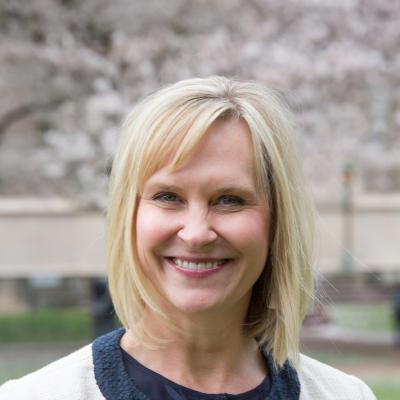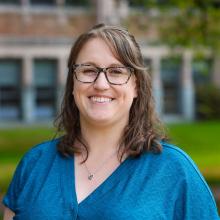
Ph.D. in School Psychology
Applications Are Currently Closed
Thank you for your interest in our program! Applications are now closed for the current application cycle and will reopen in Fall 2026.
What you can earn
Duration
Credits earned
Format
Time commitment
Upcoming deadline
Leaders of school psychology research and practice
The School Psychology Ph.D. degree prepares leaders in the field of research and practice within school psychology. Our program stresses the expanded role of the school psychologist and offers formal coursework and practica in assessment, consultation, intervention, and counseling.
Our philosophy is grounded in the scientist-practitioner model and offers a strong background in the scientific foundations for the practice of school psychology as well as training in applying current research knowledge and theory to educational services.
The program is accredited by the American Psychological Association (APA), approved by the National Association of School Psychologists (NASP), and meets requirements for state level licensure as a psychologist.
Our mission is to prepare scientist-practitioners whose practice of psychology is grounded in scientific knowledge and focused on enhancing the educational and socio-emotional competence of school-age children and youth.
- What is a health service psychologist?
The role of a health service psychologist with a specialty in school psychology is to assess, consult, and provide prevention and direct intervention services that focus on learning, behavior, and mental health. The graduate program in School Psychology at the University of Washington stresses the expanded role of the school psychologist and offers formal course work and practica in assessment, consultation, intervention, and counseling. In addition, the program philosophy is grounded in the scientist-practitioner model and offers a strong background in the scientific foundations for the practice of school psychology as well as training in applying current research knowledge and theory to educational services.

State by State Licensure Information
Curriculum
Overview
The Ph.D. degree is a six-year, full-time program that requires three years of Ed.S. degree coursework, two years of Ph.D. coursework and one year of a predoctoral internship. If you already have an Ed.S. degree, the Ph.D. course of study can be shortened to three or more years.
With the support of your advisor, you will design an individualized program of study that is guided by a supervisory committee and chaired by a core school psychology faculty member.
Students who complete their Ed.S. degree at UW will use that coursework as their specialty area. Students who completed their Ed.S. at another institution will have their transcripts reviewed to determine course credits that may be applied to their Ph.D. program of study.
As doctoral students are completing the individualized program of study requirements, they must also complete the Ph.D. degree milestones (research and inquiry, general exam, dissertation proposal, dissertation defense). These procedures are described in the program handbook sections under “Ph.D. degree milestones.”
For details, download the student handbook
Courses
- Years 1-3: Ed.S. Coursework
The first three years of the Ph.D. degree follow the course sequence of our Ed.S. degree. The Ed.S. course sequence is organized so that all basic foundation courses are completed the first year, the second year is centered on applied experiences in schools and at the University of Washington, and the third year is a full-time, school-based internship in public schools. Students who have already earned their Ed.S. degree may begin the Ph.D. coursework immediately.
- Year 4: Advanced clinical training and doctoral coursework
Autumn quarter
- EDPSY 565: Adv Practicum in Clinical Practice (4)
- EDPSY 508: Adv Practicum- Supervision & School Mental Health (2)
- EDLPS 525: Educational Inquiry (3)
- EDPSY 529: Developmental Psychopathology and the DSM (3)
- Additional cognate courses (including research methods courses)
Winter quarter
- EDPSY 565: Adv Practicum in Clinical Practice (4)
- EDPSY 508: Adv Practicum- Supervision & School Mental Health (2)
- EDLPS 526: Educational Inquiry (3)
- EDPSY 538: Multiple Regression (3)
- Additional cognate and research methods courses
- Prospective Candidacy
Spring quarter
- EDPSY 565: Adv Practicum in Clinical Practice (4)
- EDPSY 508: Adv Practicum- Supervision & School Mental Health (2)
- EDPSY 585: History, Systems, & Contemporary Issues in School Psychology (3)
- Additional cognate and research methods courses
- Research and Inquiry
Summer quarter (session A)
EDPSY 581: Seminar in APPIC/CDSPP internships (2)
- Year 5: Doctoral coursework and dissertation
Autumn quarter
- EDPSY 579: Advanced Practicum in Assessment and Intervention (3)
- Additional cognate and research methods courses
- R & I presentation (Nov)
- General Exam (Nov or Dec)
- Apply for APPIC internships
- If not doing APPIC, start working on creating a local CDSPP-aligned Internship
- EDUC 800 Dissertation (8-10 credits)*
- Register only if completing the general exam this quarter
- To obtain an add code for dissertation credits, go to education.uw.edu/practicum, select your advisor, EDUC 800 course, and describe your dissertation project.
Winter quarter
- EDPSY 579: Advanced Practicum in Assessment and Intervention (3)
- Additional cognate and research methods courses
- General Exam (if not completed in Autumn)
- Dissertation Proposal (or in Spring)
- Internship interviews and APPIC Match Day
- EDUC 800: Dissertation (8-10)
- Register for 25 dissertation credits (total) by the end of the academic year. Leave 2 credits for the following year when you defend your dissertation (final orals).
Spring quarter
- EDPSY 579: Advanced Practicum in Assessment and Intervention (3)
- Additional cognate and research methods courses
- Dissertation Proposal (if not completed in Winter)
- EDUC 800: Dissertation (8-10)
- Year 6: Pre-doctoral internship
Students apply for “on leave” status EVERY quarter except the quarter of the dissertation defense. If a student does not apply each quarter, they will drop from the University system and have to reapply for active status and pay a $250 fee to the Graduate School. During the quarter of the dissertation defense, students MUST register for the remaining 2 credits.
- Cognate
Each doctoral student is required to identify two supportive cognate fields in addition to the area of specialization. Depending upon your academic background, the range of credits required for each supportive cognate is between 6 and 15. The breadth and depth of each cognate is normally defined by the graduate advisor and the faculty member selected to represent the cognate area.
- Specialization
Each student must form a specialization from a unit outside of the College of Education. The specialization outside the College will normally be in a single department (e.g., Social Work, Public Health). In exceptional cases, it may be a series of courses from different departments containing a common thread (e.g., Ethnic Studies, which may draw upon courses based in several departments). The breadth and depth of the specialization outside the College is normally defined by the graduate faculty representative from that specialization serving on your Supervisory Committee.
Fieldwork
The culminating experience for the Ph.D. degree is a predoctoral internship, which includes advanced, integrative, supervised experiences in applying science to practice. The predoctoral internship must be completed after the general exam is passed and the dissertation proposal has been approved.
The predoctoral internship requires an additional 1,500 hours of experience and can be completed in a school or non-school setting. Students are strongly encouraged to apply to APA-accredited predoctoral internship programs through the Association of Postdoctoral Psychology and Internship Centers (APPIC) Match process. Those who do not have the ability to complete APA accredited internships must complete local predoctoral internships that are CDSPP compliant.
Completion
Students take a required 27 dissertation credits after passing the oral general examination, complete an approved dissertation proposal prior to predoctoral internship, and complete the dissertation either before or during the predoctoral internship.
Admission requirements and process
Overview
Preferential consideration is given to applicants who have had employment or volunteer experiences in P-12 schools and who also have research training and experience.
We accept applications once a year, for autumn quarter admission. You must apply to the Graduate School by December 1. Faculty reviews commence in January and continue until all vacancies are filled.
We are committed to recognizing and fostering the values derived from a diverse student population and are striving to promote increased diversity among practicing school psychologists. Toward this end, we apply a variety of criteria when evaluating applicants. We strongly encourage racially and ethnically diverse students to apply to this program.
Materials
- Degree from an accredited institution
A bachelor’s degree is required for applicants who will complete their Ed.S. degree coursework first. A degree may be in-progress when applying but it must be completed before the Program starts.
Applicants may apply to begin the Ph.D. coursework under ONE the following conditions:
- They are enrolled in the UW Ed.S. degree in School Psychology Program and have completed at least two years of coursework,
- They have completed their school psychologist certification, or
- They have earned a master’s degree or Ed.S. in school psychology.
- Unofficial transcript(s) with minimum 3.0 GPA
You must submit an unofficial transcript(s) with your application. The UW Graduate School requires a cumulative GPA of 3.0, or 3.0 for your most recent 90 graded quarter credits (60 semester credits), however this is just one part of the application.
Our programs review all applications holistically, so we encourage you to still apply. You do not need to take classes to increase your GPA. Instead, we would like for you to focus on a goal statement which discusses your interests and how the program will meet your professional or individual goals and strong letters of recommendation. You can also feel free to address why your GPA is lower than a cumulative 3.0.
- Three letters of recommendation
During the online application process, you will be given instructions for adding your recommenders and getting their letters submitted electronically. Your recommenders should be able to address:
- your communication skills, both written and oral
- your ability to interact productively with supervisors, peers, and children
- your ability to function without supervision
- your research competence and experience
- your teaching, counseling and/or assessment skills
- other relevant aspects of your academic or professional development
- Resume/vita
A current academic and professional resume or vita is required. A resume is intended to showcase your skills and experiences and to summarize the work you’ve done in your career. You should include educational degrees and professional experience, and it should also detail all relevant awards, publications, presentations or other achievements. Highlight relevant qualifications and skills that are directly connected to the program and degree to which you are applying.
Be sure to review your resume to show clear communication - free of errors - and attention to detail.
- Statement of purpose
The admissions committee uses your statement of purpose, along with other evidence, to determine whether your goals are well-matched with our Program. Your statement should address goals, relevant experience, future plans, and how the desired specific program meets your needs. Include personal experiences that have prepared you for the challenge of graduate school, topics like:
- Reasons for seeking entry into this program
- Post-baccalaureate experiences in teaching, counseling, and assessment
- Your professional aspirations
- Your research interests
Your statement must be no more than 750 words (3 pages double-spaced) using 12-point font and 1-inch margins.
- Writing sample
Doctoral candidates must submit one sample of scholarly writing. The Writing Sample is your best representation of graduate level writing. Typically, students will submit a research paper, article, or thesis from a previous program of study to represent their academic writing. Since these documents come in all sorts of formats, there is no standard guideline for submission, other than sticking within a suggested 10-12 page limit. Students are welcome to submit a portion of their document to fit within the suggested page limit.
If you do not have a writing sample some suggestions for a new writing sample might include a thesis abstract, peer-reviewed article written, research paper, literature review, a book review or report, etc.
- Personal history statement (optional)
While optional, you can add to your application by submitting a personal history statement with each application. This statement should address your intellectual growth and development, inclusive of and beyond your academic goals.
Statements should be no longer than two pages long, double-spaced, with 12-point font and 1-inch margins.
Submitting
Program is open to all eligible persons regardless of race, sex or other identity.
- Gather all required documents
- Visit the Graduate School website
- Log into your account or create a new profile if you are a first-time applicant
- Complete all steps in application process and upload your documents
- Pay the nonrefundable $90 application fee
- You may request a fee waiver during the application process
- Submit your application
Next Steps
International
We value and welcome applications from all people, including international students! If you are applying from outside the United States, there are additional requirements and application materials.
- Prior degree requirements
- At minimum, you must have the equivalent of a U.S. bachelor's degree (a four-year degree from an institution of recognized standing)
- Evaluation of your degree will be based on:
- The national system of education in the foreign country
- The type of institution
- The field of study and level of studies completed
- Transcripts
- If a transcript is in English, you can upload the transcript in the online application.
- If the degree is on a separate certificate, you will need to upload this as well. An evaluation from a 3rd party is not needed for this.
- All transcripts and degree conferral documents that are in a language other than English must be accompanied by certified English translation and must be in the same format as the original(s).
- English language proficiency
Per UW Graduate School policy, you must submit a demonstration of English language proficiency if your native language is not English and you did not earn a degree in one of the following countries:
- United States
- United Kingdom
- Australia
- Bahamas
- Canada
- Ireland
- Jamaica
- New Zealand
- Singapore
- South Africa
- Trinidad and Tobago
The following tests are accepted if the test was taken fewer than two years ago:
- TOEFL
- Minimum score: 80
- Recommended score: 92+
- The UW's 4-digit code is 4854
- IELTS
- You must request from the center where you took the test that your scores be sent electronically using the IELTS system (E-TRF) to the following address:
- University of Washington All Campuses, Organisation ID 365, Undergrad & Graduate Admis, Box 355850, Seattle, WA, 98105, United States of America
- Minimum score: 6.5
- Recommended score: 7.0+
- School information for submission:
University of Washington, All Campuses
Undergraduate & Graduate Admission
Box 355850
Seattle, WA 98195
- You must request from the center where you took the test that your scores be sent electronically using the IELTS system (E-TRF) to the following address:
- Duolingo
- Minimum score: 110
- Recommended score: 125+
- Follow the instructions on the Duolingo website to submit your scores
- Financial ability
If you apply and are offered admission to UW, you will need to submit a statement of financial ability.
Costs and funding
Estimated Costs
We are a tuition-based program. Estimated tuition rates are based on your residency:
- Washington state residents: $20,736 per year.
- Out-of-state students: $37,464 per year
Estimates are subject to change and may differ due to course load and summer quarter enrollment. Estimates include building fees, technology fees, U-Pass, etc. Additional program-specific fees are not included in this estimate.
View the UW tuition dashboard →
Visit the Office of Planning & Budgeting →
Funding & Scholarships
School Psychology Clinic
The UW School Psychology Clinic serves as a training site for graduate students in the School Psychology Ed.S. and Ph.D. programs. All services are supervised by a licensed psychologist/clinician, along with a program faculty member. The center also services as a clinical-research site for faculty and students.

Disclosure, outcomes and other data
We post Program data, including students’ time to completion, program costs, internship placement, attrition, licensure, and other disclosures.




